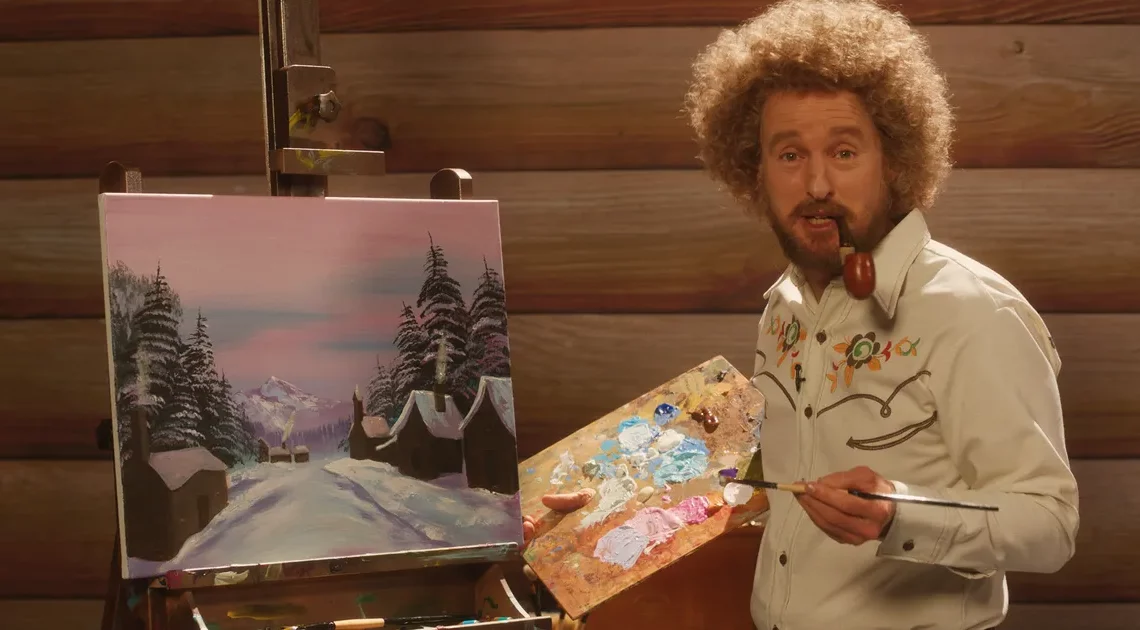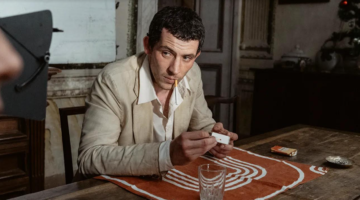Tropic Sprockets / Paint
By Ian Brockway
Brit McAdams steers an uneven but quirky film “Paint” starring Owen Wilson, and based on the PBS network television personality Bob Ross. The film has arresting surrealist touches and moments of funny madcap humor, but the conventional sitcom treatment drags the story down. While the film misses its rhythm, one part silly and one part that veers into darkness and poetry, Wilson does his best. The film would have been better served as a character study.
Bob Ross (1942-1995) was a “television artist” who had his own show “The Joy of Painting” on public television from 1983 to 1994. With his permed afro and his positive soothing voice, he painted “happy trees” and “fluffy little clouds” and made landscape painting fun for those with no experience. He was compared to Mr. Rogers for his calm and gentle approach to painting, once considered high-brow and intimidating. Ross painted some 30,000 paintings during his lifetime, featuring mountains, rivers, clouds, meadows, and streams usually with bright blue skies.
Ross became a TV celebrity, loved by millions.
Wilson is terrific in his Bob Ross role, capturing the tranquil meditative voice to perfection. Here he is Carl Nargle with a perfect afro, a cowboy shirt and a pipe. Carl is a hit with the middle aged and older demographic and women swoon over him. He is a network god and Carl basks in the glory. Carl is married to Katherine (Michaela Watkins) but he has had affairs with every PBS staff member and he justifies this by his self proclaimed status of being a successful painter. In reality, Carl can only execute several variations of one work, highlighting mountains and tall evergreen trees. Despite Carl’s network success, he is a hack with little spontaneity. Culturally, Carl is stuck in the mid 1970s. If only he can break free he might be able to do something lasting, but he is facing decline and relieved from his position. A new painter Ambrosia (Ciara Renée) with more imagination is poised to take his place.
The film is reminiscent of Tim Burton’s “Big Eyes” (2014). Both films discuss the role of kitsch in the eyes of popular imagination.
There are good moments. It is fun to watch Carl talk narcissistically about himself, knowing that he is somewhat of a charlatan in terms of his actual output.
Much of the film is taken up showing Carl jump in an out of bed with his numerous girlfriends. It is laugh out loud funny to see Carl steal the neighborhood paper because he doesn’t want anyone to read his bad review.
The trouble with the film is that the dialogue lacks punch and potency. After a while, the narrative feels canned very much like Carl’s own painting. The story drifts too far into a sitcom.
More fun is had when the focus is on Carl Nargle himself, lost in his own grandeur with a worldview of painting as an act of joy and peace. Especially in his voice, Owen Wilson captures the Bob Ross charisma, a hero to many.
While the film is anemic, lacking in force, there are some wonderful touches. In one memorable scene, Carl becomes impulsive and paints with his bushy afro and one finally sees the madcap voltage that is missing in much of the film. In another, Carl’s studio is engulfed in fire and he becomes his own living artwork as everything is consumed by flames.
The film is a poor portrait of Bob Ross, though the manic spirit of Owen Wilson greatly saves the story.
The film’s best scenes portray Carl realizing he has little to no drive or talent. But as a study, “Paint” is only a primer in revealing the man, Bob Ross and who he was as a person—a kind of Pied Piper with a paintbrush.
Write Ian at ianfree11@yahoo.com
[livemarket market_name="KONK Life LiveMarket" limit=3 category=“” show_signup=0 show_more=0]



No Comment